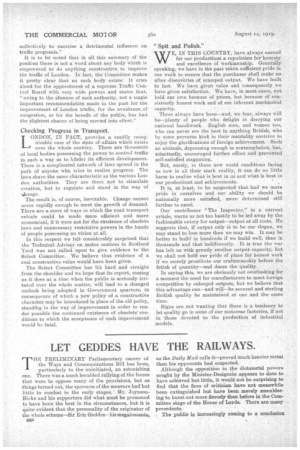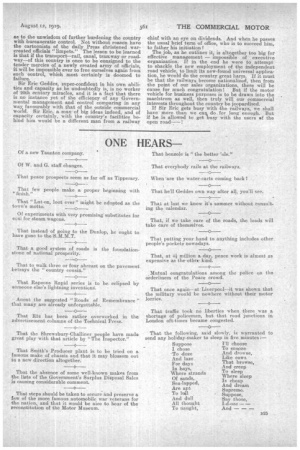LET GEDDES HAVE THE RAILWAYS.
Page 2

Page 3

If you've noticed an error in this article please click here to report it so we can fix it.
THE PRELIMINARY Parliamentary career of the Ways and Communications Bill has been, particularly to the uninitiated, an astonishing one. There was a much heralded rallying of the forces that were to oppose many of the provisions, but as things turned out, the sponsors of the measure had but little to combat in the early stages." Mr. JoynsonHicks and his supporters did what must be presumed to have been the best in the circumstances, but it is quite evident that the personality of the originator of the whole scheme—Sir Erie Geddes—hismegalomania, B24. as the Daily Mail calls it—proved much heavier metal than his opponents had suspected.
Although the opposition to the dictatorial powers sought by the Minister-Designate appears to date to have achieved but little, it would not be surprising to find that the fires of tritieism have not meanwhile been extinguished but have been merely smouldering to burst out more fiercely than before in the Committee stage of the House of Lords. There are many precedents.
The public is increasingly cooing to a conclusion
as to the unwisdom of further burdening the country with bureaucratic control. Not without reason have the cartoonists of the daily Press christened warcreated officials "limpets." The lesson to be learned is that if the transport—rail, canal, tramway or roadway—of this country is once to be consigned to the tender mercies of a newly created army of officials, it will be impossible ever to free ourselves again from such control, which most certainly is doomed to failure.
Sir Eric Geddes, super-confident in his own abilities and capacity as he undoubtedly is, is no worker of 20th century miracles, and it is a fact that there is no instance yet of the efficiency of any Governmental management and control comparing in any way favourably with that of the outside commercial world. Sir Eric, a man of big ideas indeed, and of capacity certainly, with the country's facilities behind him would be a different man from a railway chief with an eye on dividends. And when he passes the usual brief term of office, who is to succeed him, to father his initiation?
The job, as he outlines it, is altogether too big for effective management — impossible of executive organization. If in the end he were to attempt to shackle the new employment of the independent road vehicle, to limit its new-found universal application, he would do the country great harm. If it must be that the railways become nationalized, then from the point of our sales organizations, there will be cause for much congratulation! But if the motor vehicle for business purposes is to be drawn into the maelstrom as well, 'then truly will our commercial interests throughout the country be jeopardised.
If Sir Eric gets busy with -the railways, we shall have more than we ca ta do for long enough. Butif he is allowed to get busy with the users ef the open road—!
























